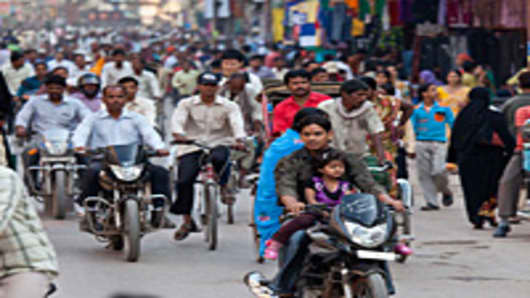Since the East India Company was granted a royal charter in India in 1600, the U.K. has always had a foothold in India, be it through business, trade or international aid programs. On Friday, however, the U.K. has announced that it will no longer be giving financial aid to India, a sign that one of the world's original BRIC economies is now more "established" than "emerging" economy.
From 2015 the U.K. will no longer give any financial aid grants to India with immediate effect, the British government's development secretary Justine Greening announced on Friday, citing "progress" in the country as a reason to evolve the U.K./India relationship into one of partnership rather than patronage.
"After reviewing the program and holding discussions with the Government of India this week, we agreed that now is the time to move to a relationship focussing on skills-sharing rather than aid," Greening announced.
"Having visited India I have seen first-hand the tremendous progress being made. India is successfully developing and our own bilateral relationship has to keep up with 21st century India. It's time to recognize India's changing place in the world," she said.
Indeed alongside China, India's economy is set to dwarf that of the G7 nations according to the Organization for Economic Cooperation and Development (OECD). By 2030, the OECD estimates that the combined gross domestic product of China and India (currently at 7.7 and 5.5 percent respectively) will overtake the seven foremost most economically developed and rich nations.
Though no existing aid programs will be canceled, there will be no new ones commissioned, saving the U.K. 200 million pounds ($319 million). An underlying point to the cessation of European aid to India is the the rapid boom of India's economy, as the erstwhile powerful economies decline.
India's foreign minister Salman Khurshid responded to the news saying that "Aid is the past and trade is the future."
(Read More: India's Secret Weapon: It's Young Population)
"India is very keen to be seen as a big player on the world stage," Claudine Fry, South Asia analyst at Control Risks told CNBC, arguing that India wanted to be seen as an independent economic nation.
"It wants to be seen as an investment destination," she said.
"You can see this move in the context of India growing and developing rapidly and there is a perception that India doesn't need aid anymore. Also, it's difficult for a government like the U.K.'s to justify financial aid to countries like India to their taxpayers."
"There is a move now, especially under David Cameron's administration, to focus on bilateral relationship, rather than aid," Fry added.
Indeed, British Prime Minister David Cameron and the Foreign Secretary William Hague have been committed to cultivating a trade relationship with India. Hague returned from India just this week.
Britain seeking a more equal trade partnership reflects the growing importance of seeing India not as a suppliant partner but an equal. Data showed that bilateral trade grew by 20 percent in 2010 equating to 13 billion pounds of trade. U.K. goods export to India grew by 37 percent and goods imports from India rose by 27 percent in 2010.
Though a wealthy middle class has rapidly sprung up in India (according to the 2012 list of the world's billionaires compiled annually by Forbes, 48 of the 1,153 billionaires are from India, accounting for a little over 4 percent of the total), an estimated third of the world's poorest people are to be found in India, according to the World Bank.
The British government says that India's social welfare spending (equating to 70 billion pounds) has helped lift 60 million people out of poverty and that it will continue to liaise with the country on poverty reduction.
Despite this reassurance, there are fears that the poorest members of India's society will suffer.
The charity Save the Children told BBC News that it believed the decision was "premature".
"Despite India's impressive economic progress, 1.6 million children died in India last year - a quarter of all global child deaths," according to Kitty Arie, the charity's director of advocacy.
"We agree that in the longer term, aid to India should be phased out as the country continues to develop, but we believe that the poorest children will need our ongoing help."



